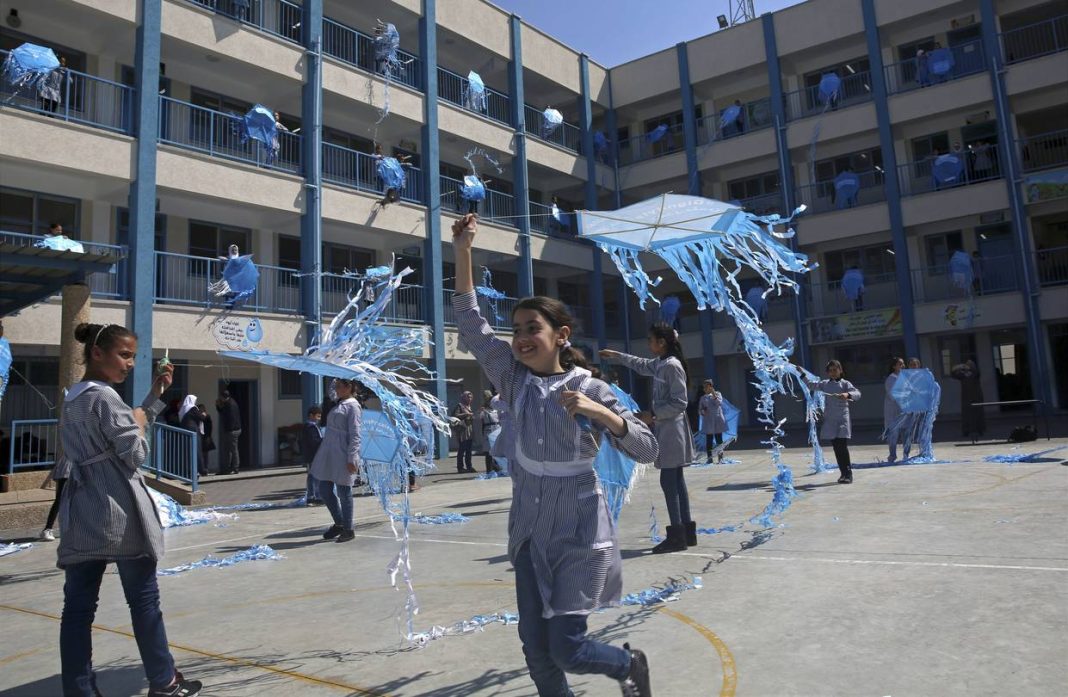UNRWA runs 288 schools within the Gaza Strip, providing education to Palestinian refugees, who make up around two-thirds of the total population of the besieged enclave.
Since its establishment in 1949, following the mass expulsion of Palestinians during the creation of Israel in 1948, UNRWA has been committed to providing support, protection and essential services to approximately 5.6 million registered Palestinian refugees in Jordan, Lebanon, Syria, the West Bank and Gaza Strip.
This year, however, major spending cuts at the organisation mean many students fear they will not be able to finish their terms.
Gaza Adnan Abu Hasna, spokesperson for UNRWA in Gaza, told Middle East Eye that UNRWA had a shortfall of approximately $200m.
“We paid our teachers for August – however, we may not be able to pay them for September, as we have not got the funds for this yet,” he explained.
Abu Hasna attributed the crisis to a worsening global economy, and the war between Russia and Ukraine, which has resulted in the displacement of millions of Ukrainians.
“This has, of course, put more pressure on the donating countries,” he said.
This is not the first financial crisis facing the UNRWA.
The biggest hit to the organisation came in 2018, when former American President Donald Trump halted US funds to the refugee agency. Funding was resumed in April 2021 following the election of Joe Biden.
Abu Hasna stated that at present, UNRWA did not have the money to pay its employees until the end of the year.
“We will have the annual funds by the end of the year, but the shortage we have now is for the four months left of 2023,” he added.
Elham Hilles, 34, a mother of four children who study at UNRWA schools, said the news was a concern to her, as she was happy with their education.
“If the academic year stops next month, I will of course take the decision to move my children to government schools, but I just hope this won’t happen,” she told Middle East Eye in a phone interview.
On Wednesday, the Gaza director of UNRWA’s affairs, Thomas White, shared a picture of himself on social media, chatting with school students during his visit to Gaza earlier in August. In the tweet he confirmed the financial shortage and conceded that “the best thing we can do is provide them an education that is at risk without the additional funds”.
Mona Ahmed, a UNRWA English teacher who spoke to MEE on condition of anonymity, said that she was not overly concerned about the prospect of not receiving her salary, as “we frequently hear about these financial shortages, but our payments are consistently received in the end”.
Mona, who is one of 9,367 teachers working with UNRWA in the Gaza Strip, confirmed that the situation at her school highlighted the need for additional funding.
“I have over 45 students in each class, which is a notably large number that makes it challenging to provide each child with the individual attention they deserve,” she admitted.
Mona voiced her desire for at least a whiteboard in the classroom, noting that she was still using green boards and chalk.
“I’m requesting a whiteboard at a time when some children worldwide have access to tablets – can you imagine?” she added.
Despite never experiencing a salary reduction or delay, Mona still believes that the salary she receives – approximately $800 per month – is inadequate and does not reflect the stress of the job.
UNRWA recently announced the opening of three new schools in Khan Younis, south of the Gaza Strip, and Gaza City. It is also recruiting over 500 new teachers.
Mariam Rayyes, a mother of two students, said she was very worried to hear news of UNRWA’s financial shortfall, because if the UNRWA-run schools closed, she would be left with no other option as she had little respect for the Hamas-run government schools.
“I don’t think of sending my two daughters to a government-run school, I prefer UNRWA schools or private schools. But I don’t think I can afford private schools,” she added.
According to the World Bank, poverty in Gaza increased from 38.8 percent of the population to 53 percent by 2020. In 2017, over 75 percent of households depended on various forms of social assistance.
Gaza has been under an Israeli blockade since 2007, following Hamas’s victory in the 2006 parliamentary elections. Since then, Gaza has endured more than four military Israeli offensives, and many rounds of escalations.
Abu Hasna stated he was hopeful that the upcoming donors’ conference in New York, scheduled for September, would secure the necessary funding for UNRWA to resume its vital services.
Nonetheless, he highlighted that the agency’s financial situation is significantly influenced by global political shifts.
“With the prevalence of right-wing governments in donor nations, supporting UNRWA becomes increasingly challenging, especially considering the escalating conflicts in various regions across the globe,” he continued.
